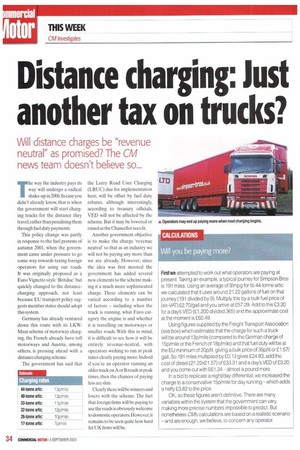Distance charging: Just another tax on trucks?
Page 34

If you've noticed an error in this article please click here to report it so we can fix it.
Will distance charges be "revenue neutral" as promised? The CM news team doesn't believe so...
The way the industry pays its way will undergo a radical shake-up in 2006. In case you didn't already know, that is when the government will start charging trucks for the distance they travel, rather than penalising them through fuel duty payments.
This policy change was partly in response to the fuel protests of autumn 2001, when the government came under pressure to go some way towards taxing foreign operators for using our roads. It was originally proposed as a Euro Vignette-style 'Britdise but quickly changed to the distancecharging approach, not least because EU transport policy suggests member states should adopt this system.
Germany has already ventured down this route with its LKWMaut scheme of motorway charging, the French already have toll motorways and Austria, among others, is pressing ahead with a distance charging scheme.
The government has said that the Lorry Road User Charging (LRUC) due for implementation here, will be offset by fuel duty rebates, although interestingly, according to treasury officials. VED will not be affected by the scheme. But it may be lowered or raised as the Chancellor sees fit.
Another government objective is to make the charge 'revenue neutral' so that as an industry we will not be paying any more than we are already. However, since the idea was first mooted the government has added several new elements to the scheme making it a much more sophisticated charge. These elements can be varied according to a number of factors — including when the truck is running, what Euro category the engine is and whether it is travelling on motorways or smaller roads. With this in mind, it is difficult to see how it will be entirely revenue-neutral, with operators wishing to run at peak times clearly paying more. Indeed if you're an operator running an older truck on A or B roads at peak times, then the chances of paying less are slim.
Clearly there will be winners and losers with the scheme. The fact that foreign firms will be paying to use the roads is obviously welcome to domestic operators. Howe ver, it remains to be seen quite how hard hit UK firms will be.
















































































































































































































